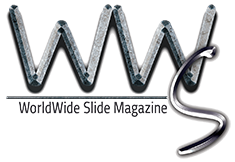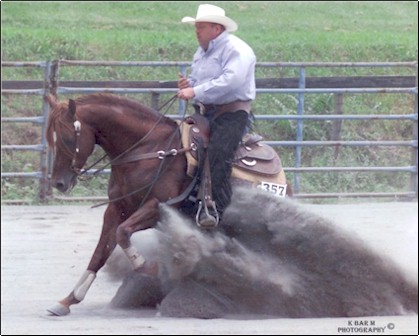Charlie Smith & Dutch Champman
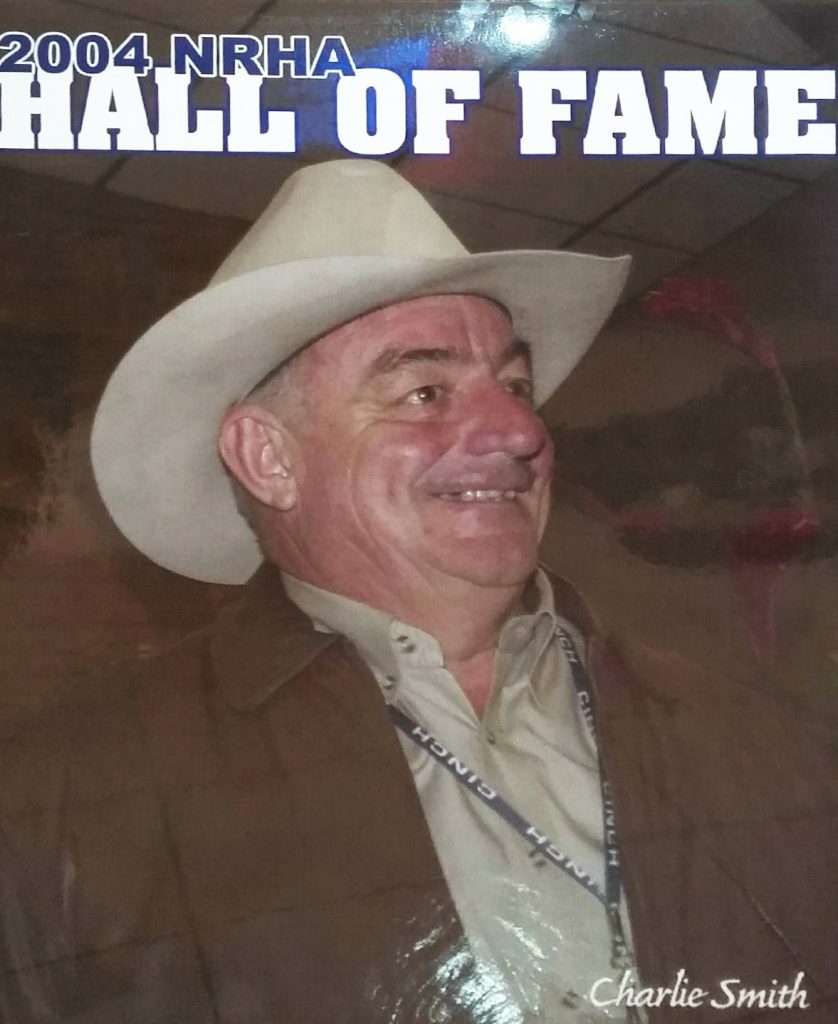
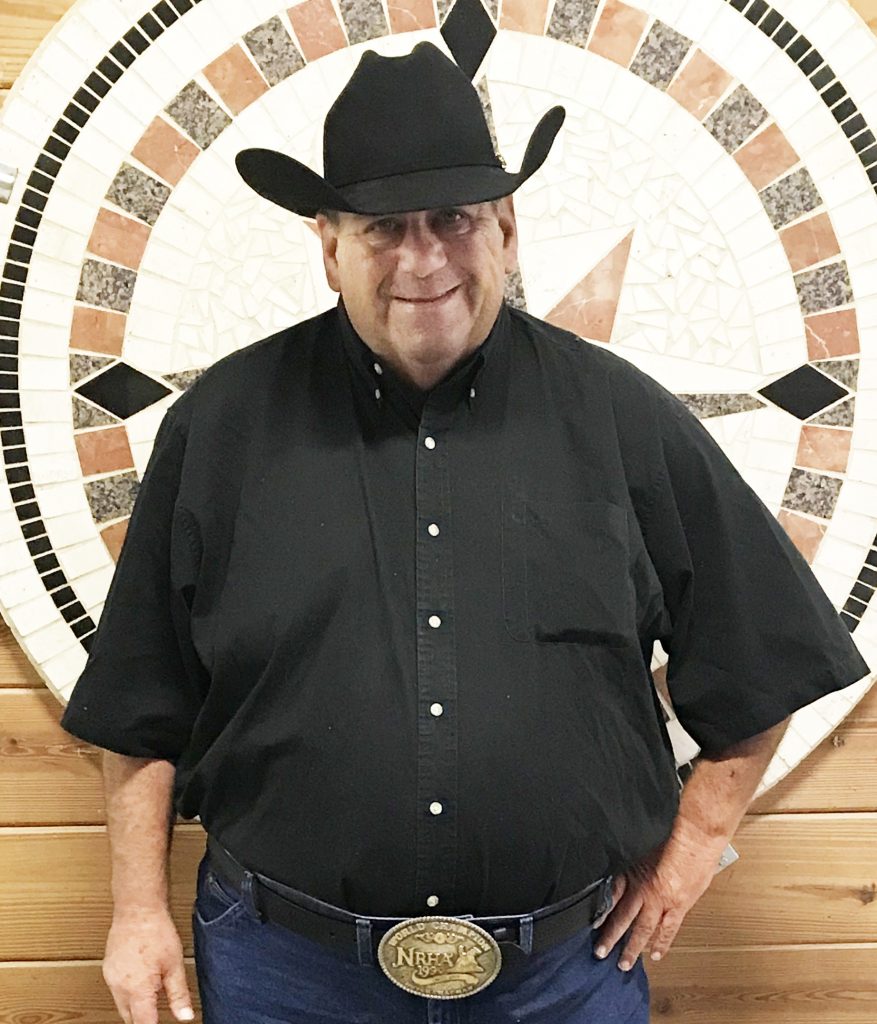
From the beginning, there was the run for the titles. These year-long missions likely created more lifelong National Reining Horse Association members than any other facet of the industry.
If a reiner’s goal was a title or a Top Ten, the road to the finish line required resolve, focus, and lots of work. The miles traveled provided time to reflect – to rebound from less than stellar performances or to bask in a recent victory. Either way, the next show could humble a cocky winner, or it could bring vindication to someone still recoiling from the last mistake-laden memory.
Hauling partners became lifelong friends. Each trip and each show created a wealth of experience and an abundance of memories. People learned to absorb the heartbreak and the fairy tale that is competition and came to understand that it was equally essential to share both.
Sleep was simply postponed and life was planned around the need to get to shows.
At the end of the year, results determined champions and the elite 10 in each class, but there was a measure of pride at having made the journey and being part of a special society that transcended the tally sheet.
Finally, when the awards and accolades came, the camaraderie that had grown along the way had everyone sharing the moment.
That’s because it took a team.
It also took a team leader.
The two most successful leaders in the NRHA are Charlie Smith and Dutch Chapman. Together and separately, they helped more youth, non pro and open riders to reach their dreams of Top Ten success than anyone in NRHA’s history.
Charlie Smith has been a mentor to many. He shared his love of reining with countless riders and inspired in them his passion for success. He’s been a keen lifelong learner and is known as a magician as far as matching a horse to a rider.
He began as a Non Pro then transitioned to being an Open rider. In the show ring himself, he garnered a total of 6 world championships and equal amount of reserves. He is a respected NRHA judge and former Judges Committee member, who officiated at the NRHA Futurity and Derby. He also helped start the NRHA youth program. But it was as a coach and trainer for youth and Non Pros that he created a legacy, with hundreds of his riders earning championships and Top Ten finishes.
Throughout the years, he was known for hauling so many horse and riders that former NRHA President Tom Sumpter once stated, “During the 70’s and 80’s, if Charlie didn’t show up with his customers it made for a very small reining.”
Charlie Smith
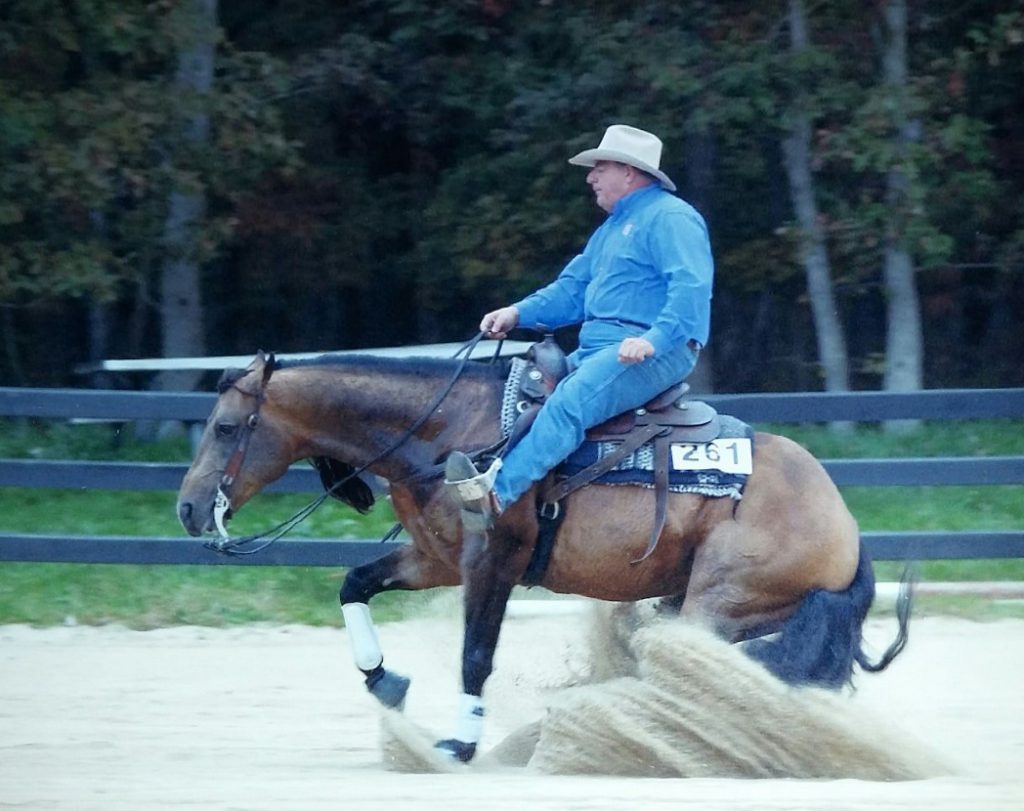
Born and raised in Maryland, Charlie always loved horses, although his family had nothing to do with them. His neighbor had horses, though, and that led to him getting a pony that he first rode bareback, then took to shows. He started jumping, then moved to an older horse that he ran in barrels, poles, and keyhole race.
But, in the 60’s, he first saw reining when Bob Anthony was showing Willow Brook Farms’ Easter Cody at American Quarter Horse Association shows. Seeing that level of excellence and the signature NRHA bronzes gave him a vision and a goal. He began to show in reining classes at open shows and by 1971 he was competing at NRHA events.
As Charlie progressed in reining, he worked to refine his riding technique. He remembered, “Bob Anthony said my hands could stop an elephant!”
He applied himself to improving his riding skills, and to develop an understanding of the sport and the industry. He kept trying to learn, going to other trainers, like Bob Mac. “He had a breeding program going and was taking three horses to the Futurity finals each year. He won the NRHA’s first open world title. His kid was youngest to win a bronze. The list goes on. I used to go stare at those bronze trophies,” Charlie shared.
Charlie won his own first big bronze at Quarterama in Toronto, Ontario. His burgeoning passion for competition soon made him want to get to every show possible.
When he first moved to Memory Lane farm in Westminster, Maryland, it was a boarding farm, but the focus soon changed. Charlie held reining shows at the farm and promoted the sport. Interestingly, if a horse didn’t cross water, you couldn’t show him there because where you parked and where the arena was, was separated by a 10-foot wide creek. Actually, it wasn’t exactly an arena; it was Charlie’s track. During the shows the arena boundary would be marked with stakes and caution tape.
“I’d go out to reinings when everyone else wanted to stay home. I’d go from Nebraska to Indiana to Long Island to Middleton, New York, hauling myself and other people for titles, “just kind of happened,” Charlie said. “I couldn’t afford to go down the road by myself but then I got a group and together we could do it. I’d put four in a car and tell them to split gas and I’d take a stock trailer with 10 horses and haul them for 10 or 15 cents a mile.”
He put two things in front of his riders who wanted to be reiners. He would tell them, “Here’s an NRHA membership form. Fill it out and send it in. Here’s an NRHA Rulebook. Memorize it!”
The Memory Lane Farm team grew to become a formidable juggernaut of horses and riders. Charlie remembered, “We were hauling 20 to 30 head to each show.”
For many, the goal was to “beat Charlie Smith’s Group.” Charlie’s passion for reining was contagious and it grew into the Mason Dixon Reining Association.
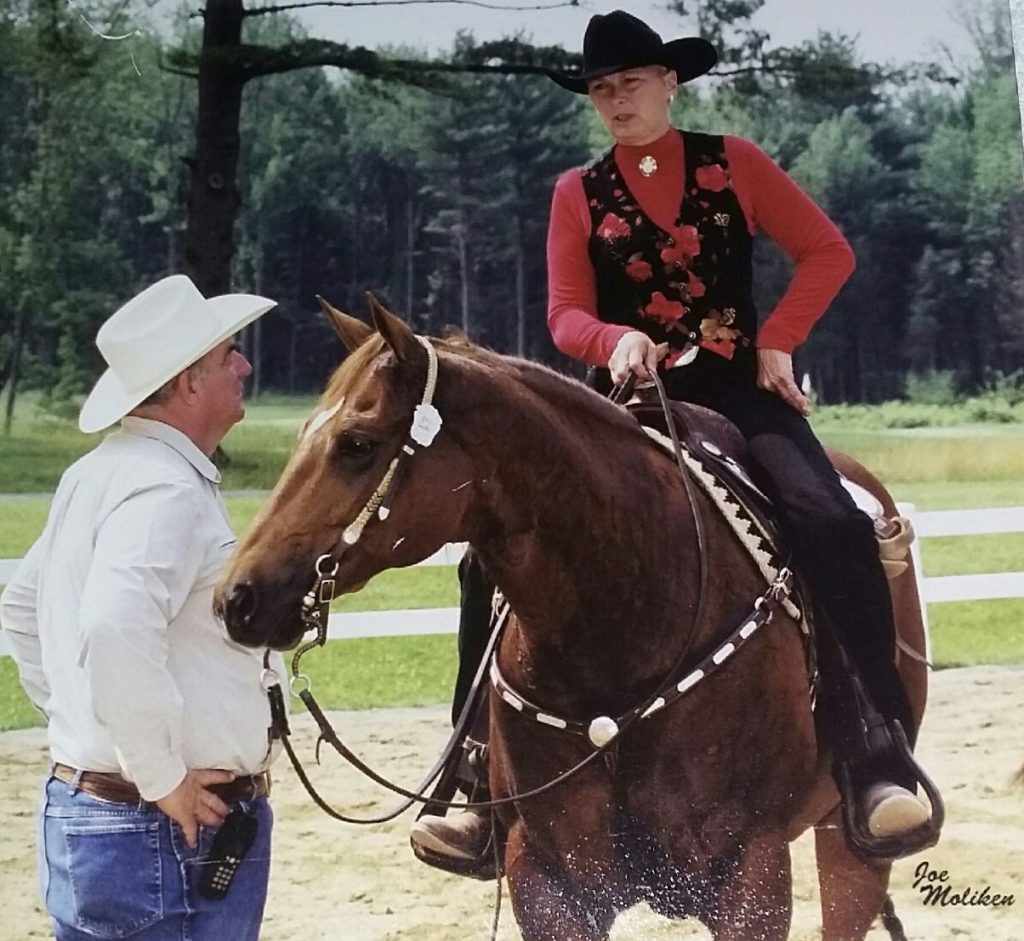
Riding with Charlie required commitment as well as complete trust in his direction. He quickly became known for how he could match a horse to a rider, and he picked all the horses for his youth and non pro riders. During one memorable day of riding, he told five people to change horses and they did, then all went to the barn afterward to transfer the papers.
He remembered, “I’d take a lot of horses and recycle them. I’d take a non pro horse and put a youth on it. Or vice-versa. And we’d go every weekend we could to show on Saturday and Sunday. Everything I’d buy was a finished horse. I never fooled with young horses. I wanted to go to the car lot and buy a car I could drive, not go buy parts and pull them together.”
By today’s standards, Charlie’s coaching techniques were admittedly tough. “They did have to have thick skin with me, but I wouldn’t let them fail. I’d watch every part of every run and tell them what they did or didn’t do,” he said.
He felt that video cameras were a godsend and an incredible teaching tool when they were developed and became available to the masses. “It was great when they came out with videos. When I told them they missed a lead and were not paying attention, I could show it to them.”
To Charlie, teaching feel was paramount, along with preparing his riders ahead of time by telling them what to do. He wanted them to have a game plan for their run. He also wanted them to learn from other riders. If one of the riders was getting ready to go, his other riders were expected to be there to help, prior to and after the run, and to watch.
When each run began, Charlie would get to the 50-yard line to coach from outside the arena. “I’d tell them you can’t get lost on the playing field and you can’t get lost in the show pen. I drilled them on what to do and gave them tools to fix the run if something went wrong.”
He continued, “I didn’t want them to be surprised – I knew each individual and I helped them understand the mistakes they were making. They always knew that I’d be right in the trenches with them. I’d tell people they were paying me a lot of money to have success – not paying me to tell them that they did great if they didn’t. If what you want to do is to win, we have to be honest. I always wanted it so badly for my customers – I wanted their success. I wouldn’t let them fail. I’d stay in their corner until they got better.”
Relationships were always important to Charlie. “My upline is Bob Anthony and Bill Horn. I am Dutchie’s upline and Shannon Rafacz and Danny Sanborn’s, for example.”
For both non pros and assistant trainers, he stressed. “Always set your goals high! But understand that you are never going to do this without working hard. If you are not willing to do that you won’t be successful. Don’t let anyone steal your dreams and your goals and don’t wreck them yourself because you are not willing to do the work.”
The process was validated by the incredible results. He and his clients won and won again. In 1990, a stellar year, his barn claimed eight out of the nine titles on the line, along with three reserves! The names of people who rode with him have become part of history.
Charlie’s World Titles
| Year | Class | Title | Horse | Rider |
| 1979 | Non Pro | Reserve World Champion | Pistol Machete 2 | |
| 1984 | Non Pro | Reserve World Champion | Buckie Missile | |
| 1988 | Non Pro | Reserve World Champion | Hes A Cojac | |
| 1989 | Novice Horse Non Pro | World Champion | Boogies Yellow Jac | |
| 1990 | Non Pro | World Champion | Tonya Lea Pine | |
| 1990 | Novice Horse Non Pro | World Champion | Kelinds Lady Jac | |
| 1991 | Non Pro | Reserve World Champion | Bo Betty Pine | |
| 2001 | Intermediate Open | World Champion | Jacs Pic A Nic | |
| 2001 | Open | Reserve World Champion | Jacs Pic A Nic | |
| Coached World Titles | ||||
| 1987 | Youth 14-18 | Reserve World Champion | Gray | Andrea Petruzzello |
| 1988 | Youth 13 & Under | World Champion | Kelinds Lady Jac | Justin Daniels |
| 1988 | Youth 13 & Under | Reserve World Champion | Gray | Shannon Raymond Rafacz |
| 1988 | Limited Non Pro | World Champion | Pines Fourway Stop | Sandy Frantz |
| 1989 | Youth 13 & Under | World Champion | Bright Smokes Red | Shannon Raymond Rafacz |
| 1989 | Youth 13 & Under | Reserve World Champion | Berts Love | Justin Daniels |
| 1989 | Youth 14-18 | World Champion | Aces Jedi | Randy Smith |
| 1990 | Intermediate Non Pro | World Champion | Bo Betty Pine | Sandy Frantz |
| 1990 | Youth 13 & Under | World Champion | Heso Hot | Michele Langohr |
| 1990 | Youth 14-18 | Reserve World Champion | Boggies Yellow Jac | Keith Krantz |
| 1990 | Limited Non Pro | World Champion | Sarah Diamond | Shannon Raymond Rafacz |
| 1991 | Intermediate Non Pro | World Champion | One Great Dude | Shannon Raymond Rafacz |
| 1991 | Novice Horse Non Pro | World Champion | Miss Boggie Babe | Sandy Frantz |
| 1991 | Youth 13 & Under | World Champion | Top Gun | Michele Langohr |
| 1991 | Limited Non Pro | World Champion | Peanut Kid Cody | Debra LaPorta |
| 1992 | Novice Horse Non Pro | World Champion | From Nowhere | Shannon Raymond Rafacz |
| 1992 | Novice Horse Non Pro | Reserve World Champion | Sweet Rocky Doc | Bob LaPorta |
| 1992 | Limited Non Pro | World Champion | Dry Doc Bobbie | Michele Langohr |
| 1992 | Novice Horse Open | Reserve World Champion | From Nowhere | Shannon Raymond Rafacz |
| 1993 | Limited Non Pro | Reserve World Champion | Ima Jody Hank Two | Bonnie Hippensteel |
| 1994 | Intermediate Non Pro | Reserve World Champion | Miss Fisty Joe | Bonnie Hippensteel |
| 1994 | Non Pro | Reserve World Champion | Miss Fisty Joe | Bonnie Hippensteel |
| 1995 | Novice Horse Non Pro | World Champion | Bar Bill BH | Bonnie Hippensteel |
| 1996 | Novice Horse Non Pro | Reserve World Champion | Not Dun Smoken | Bonnie Hippensteel |
| 1997 | Non Pro | Reserve World Champion | Faithfully Dun | Bonnie Hippensteel |
| 2001 | Non Pro | World Champion | Sweepalena | Bonnie Hippensteel |
| 2002 | Non Pro | World Champion | The Whiz Master | Bonnie Hippensteel |
| 2002 | Intermediate Non Pro | World Champion | Jac Pic A Nic | John Crist |
| 2003 | Novice Horse Open | Reserve World Champion | Tejons Lady | Shannon Raymond Rafacz |
| 2003 | Novice Horse Non Pro | World Champion | Tejons Lady | Shannon Raymond Rafacz |
| 2003 | Limited Non Pro | Reserve World Champion | Friskies Big Freckle | Catherine Crandon |
| 2004 | Novice Horse Non Pro | World Champion | Tatoo Tun Gunner | Shannon Raymond Rafacz |
| 2004 | Novice Horse Non Pro | Reserve World Champion | Dunits Little Peppy | Bonnie Hippensteel |
| 2004 | Youth 14-18 | World Champion | Melon Kali Jac | CR Hogendorp |
| 2004 | Intermediate Non Pro | World Champion | Style With Me | Catherine Crandon |
| 2004 | Limited Non Pro | World Champion | Melon Kali Jac | CR Hogendorp |
| 2005 | Intermediate Non Pro | World Champion | Babs Boomer Boy | CR Hogendorp |
| 2005 | Intermediate Non Pro | Reserve World Champion | Docs Whizn | Suzi De Champlain |
| 2005 | Limited Non Pro | World Champion | Docs Whizn | Suzi De Champlain |
| 2008 | Limited Open | Reserve World Champion | MDS Sailing Prize | Susie Campbell |
| 2008 | Youth 14-18 | Reserve World Champion | Docs Whizn | Lauren Tieche |
| 2008 | Intermediate Non Pro | World Champion | Vintage Boom | Katarina Dorminy |
| 2008 | Limited Non Pro | World Champion | Dual Doc Peppy | Lauren Tieche |
| 2009 | Non Pro | Reserve World Champion | Lenas Taxman | Bonnie Hippensteel |
| 2009 | Prime Time Non Pro | World Champion | Lenas Taxman | Bonnie Hippensteel |
| 2009 | Intermediate Non Pro | Reserve World Champion | Malt Whizkey | Suzi De Champlain |
| 2010 | Non Pro | World Champion | Hes Justa Benz | Bonnie Hippensteel |
| 2010 | Prime Time Non Pro | World Champion | Hes Justa Benz | Bonnie Hippensteel |
| 2011 | Limited Open | World Champion | Hail Of A Nic | Judith Vetter |
| 2011 | Rookie Pro | World Champion | Hail Of A Nic | Judith Vetter |
| 2012 | Novice Horse Non Pro | Reserve World Champion | Smart Little Stepper | Bonnie Hippensteel |
| 1999 | Rookie Of The Year | Champion | BH Jessie | John Crist |
Even today, at the age of 72, Charlie, who makes his home at Beverly Hills, Florida, is still working to help other riders. He’ll be putting on a reining clinic at Willow Brook Farms May 20 and 21. For information visit the Keystone Reining Horse Association Facebook page.
Dutch Chapman
Dutch Chapman’s decades of involvement with reining and reiners has resulted in a bevy of laurels – mostly for the people who rode with him or those who worked with him as assistant trainers although he also won two world titles himself. Within that list were multiple world and reserve world titles, countless aged event wins, reserves and finalist finishes, along with All American Quarter Horse Congress wins and NRHA year-end Top Ten finishes. And those are just what they won during the time they were riding with him!
The list of trainers who have been part of his program is an impressive one, led by names like Craig Schmersal, Brian Bell,Jerry Coleman, Jeremy Gates, Steve Siadek, Jane Mount, Lucy Bluen, Oliver Vandenberg, Missy Makela, Erik Bohan, Breann Huyett, Martin Audet, Maya Stessin, Martina Morell, Mandy Yarbrough, Olivier van den Berg, Giuseppe Gallotto, Martina Morell, Martin Audet, Taylor Davis, and Blacey Bakutis.
Non Pro and Open riders alike benefited from his focus, and many used that quality foundation he gave them to propel their careers to continued successes.
Dutch Chapman
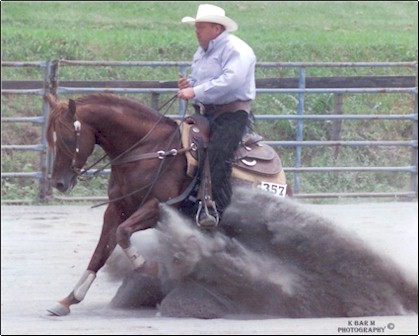
Dutch Chapman always liked horses and got his first one when he was about nine years old. He remembered, “My parents raised dogs and sold them and there was a lady who wanted to buy a puppy. She didn’t have enough money, but had a little pinto mare tied in the yard. My dad asked what she was doing with that horse, and she told him nothing. My dad was into horses when he was younger, so he traded a couple of dogs for it.”
Dutch got a saddle and learned to ride. “I remember my first time to make money riding a horse, and it was on Trudy, that little pinto. My dad had bought a pickup at the Ford dealership right when Ford Pinto came out. My dad talked to everyone, and he told them at the dealership about us having a pinto horse. They paid me $50 a day to ride up and down in front of dealership to promote the Pintos. I was 10 years old, and it was my first money I ever earned on a horse,” he recalled.
In 1972, Dutch went to his first horse show at the nearby Howard County Fairgrounds, He won two green ribbons and his horse show career was begun.
He said, “We started going more and got different horses. I had this black horse that was just green broke when I got him, so I messed around training him and went to show him in pleasure, horsemanship, trail, and reining. In that reining we had to go run a couple figure eights and go stop and do a rollback. I enjoyed that a lot, but I wasn’t winning anything. I was 12 years old and in this Junior class where you’d ride to the judge, and they’d tell you things to help you. The judge said that I did pretty good, but I was on the wrong lead.”
When he walked out to the family station wagon and two horse trailer his mom asked what the judge had told him. Dutch recounted, “I told her that he said I did pretty good but was on the wrong lead. Mom asked what a lead was and I told her I didn’t know. There was a guy at the show who was always going around in a big hurry. Mom called him ‘the cowboy.’ She said we should talk to him and see if he could teach me some stuff.”
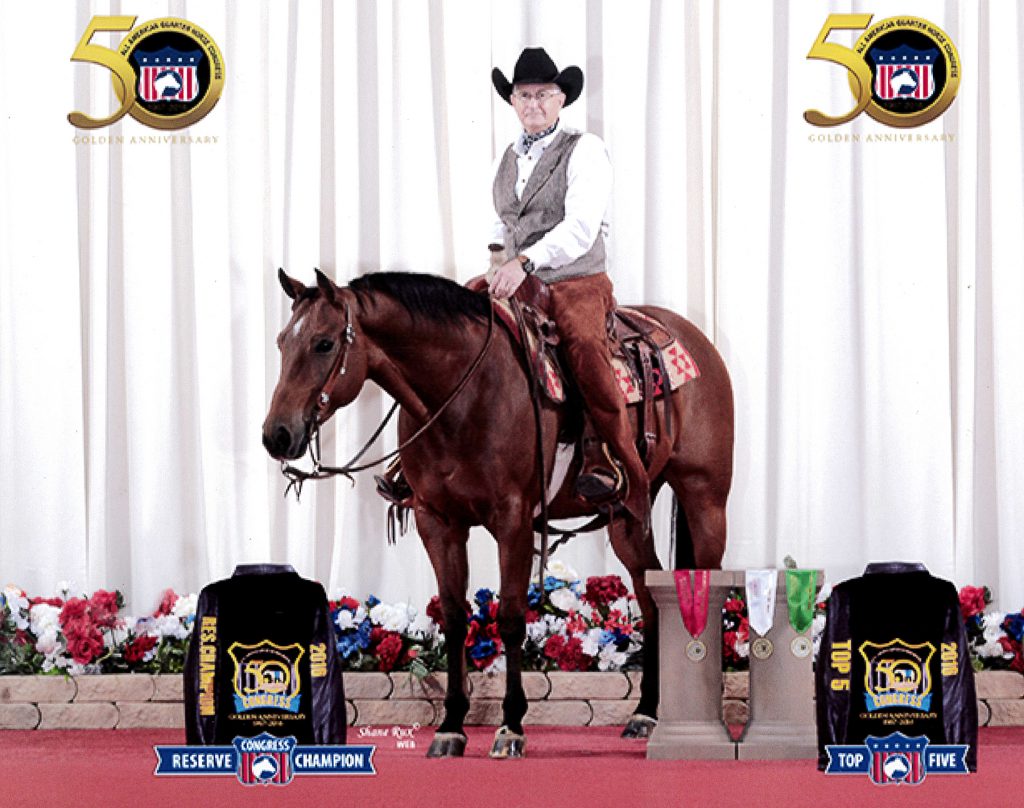
The man’s name was Charlie Smith.
Dutch remembered, “I rode with him while he was basically working his way into reining. Charlie always had different horses. He showed me horses that could spin and slide and I’d go home and try to teach mine. It got to where I’d show in the Junior and he’d show in Senior and after a few years we were winning everything.”
Dutch continued riding but drifted away from showing as much when school and other activities occupied him. “I’d see Charlie now and then, but then he moved to Westminster just right up the road, so I’d go over and visit and watch them ride and he’d let me ride.”
He remembered, “Charlie was always buying and selling horses but he was getting more into reining – he’d go out to Long Island and buy from Bob Mac and to Ohio to buy from Bill Horn. He’d buy horses that didn’t make it as top level aged event horse. We’d work on them and take them to open shows and be like kings.”
Then, in 1985, when his father died, things changed. “I was 25 years old and was renting a barn where I had a few horses and Charlie said, ‘Why don’t you come over here and work for me? You can feed and clean stalls and ride horses.’ so I did. I kept one horse and sold the others and he paid me $25 a week plus a tank of gas and one stall for my horse.”
He continued, “We’d ride the horses he bought and it was unbelievable. Eventually we were selling to locals – they were having fun and we started working with these people and giving lessons. Then over next couple of years we started going to NRHA shows, then hauling a lot of people and horses to those shows.”
It was a productive time that resulted in countless wins and year-end championships, and it lasted until Dutch opted to move his operation to Summerwind Farms in Damascus, Maryland mid-year in 1993.
Amazingly, the success of Dutch’s clients and trainers continued and increased as he built on everything he had learned and continued to study, grow, and elevate his program. Soon multiple articles featuring his training and coaching techniques appeared in major publications, including the Reiner Magazine and the Quarter Horse Journal. His program and coaching techniques were studied and emulated.
Dutch had found his calling as a coach and he was as committed to his riders as he expected them to be to riding. He said, “I really would push them to do good; I thought if you were good today you could be better tomorrow. I had a knack to watch someone ride and show and I could see stuff that was getting in their way. I could just see it and tell them, ‘You know if you start doing this, then this will be better.’”
There were varying degrees of dedication with the people who rode with him. He said, “Some people came to me and said, ‘I want to learn to rein and go show and have fun.’ That’s great and there is a place for that. Others came to me and said, ‘I want you to make me the best there is no matter what it takes.’ I tell those to be careful what you wish for. There will be days you might hate me – but I’m going to make you win. How bad do you want to work to get what you want?”
Today, as in the past, trainers at Chapman’s barn can expect to stretch their work ethic to the limit as well. He said, “They work 70 hours a week and do what ever it takes to get where they need to get. Some trainers who have worked for me have been very successful. But even the trainers who worked for me who are not as famous are doing well and they are supporting their families. I’m proud of that.”
What does Dutch look for in a horse? “I want trainability. I’ll take the great-minded horse over the more talented one that doesn’t have a good mind. I won a lot on horses that were not as high caliber, but you could pull the trigger and they’d be there for you every time.” He always felt a key to great horsemanship was finesse and has continually taught it to his clients and assistant coaches.
Dutch has been involved with all the major east coast reining organizations, including Eastern Pennsylvania Reining Horse Association, Virginia Reining Horse Association, Southeast Reining Horse Association, Florida Reining Horse Association and Northeast Reining Horse Association. He has he has helped across the board, from show planning to sponsorship of various levels of awards. He encourages his customers to join these organizations and become involved.
But the ultimate reward remains a year-end title. “I think the Top Ten program is very important. It has brought so many people into the industry and into the NRHA – it’s the association’s backbone. The local shows really support the high-profile upper end because people see the Top Ten and want to go do it themselves, then they are exposed to even more that they can dream about,” he said.
He and his clients won an array of those titles and are still winning today:
Dutch’s World Titles
| Year | Class | Title | Horse | Rider |
| 1990 | Limited Open | World Champion | Smoke And Lightning | Dutch Chapman |
| 1992 | Novice Horse Open | World Champion | Tiny Money Miss | Dutch Chapman |
| Coached World Title | ||||
| 1989 | Limited Non Pro | World Champion | Be Aeches Bo | JoAnn Bostian |
| 1993 | Intermediate Non Pro | World Champion | Cee Blair Sailor | Amanda Connor Miller |
| 1993 | Intermediate Non Pro | Reserve world champion | Sweet Rocky Doc | Bob LaPorta |
| 1993 | Non Pro | World Champion | Jacs Lil Pine Jr | Shannon Raymond Rafacz |
| 1993 | Limited Non Pro | World Champion | Kitty San Twist | Cheree Kirkbride |
| 1993 | Novice Horse Non Pro | World Champion | Dry Wood Smoke | JoAnn Bostian |
| 1993 | Youth 13 & Under | Reserve world champion | Crome Plated Jackie | Erin Connor |
| 1994 | Intermediate Non Pro | World Champion | Hollywinder | Cheree Kirkbride |
| 1994 | Open | World Champion | Cee Blair Sailor | Craig Schmersal |
| 1994 | Limited Open | World Champion | Cee Blair Sailor | Craig Schmersal |
| 1994 | Novice Horse Open | Reserve world champion | My Ways Nicki | Craig Schmersal |
| 1994 | Novice Horse Non Pro | World Champion | Dun It Sweetly | Lee Schield |
| 1994 | Youth 14-18 | World Champion | Dry Wood Smoke | Michele Langohr |
| 1995 | Intermediate Non Pro | World Champion | Dun Commander Aces | Karen Shedlauskas |
| 1995 | Limited Open | World Champion | Bo Chanda | Steve Siadik |
| 1995 | Youth 14-18 | Reserve world champion | The Great Lady | Tommy Milnes |
| 1996 | Non Pro | World Champion | Freckles Top Prize | Shannon Raymond Rafacz |
| 1996 | Novice Horse Open | Reserve world champion | A Wild Joker | Bob LaPorta |
| 1996 | Novice Horse Non Pro | World Champion | A Wild Joker | Bob LaPorta |
| 1996 | Youth 13 & Under | World Champion | Dun Already Dry | Tammy Tanner |
| 1997 | Intermediate Non Pro | Reserve world champion | Miss Dude Step | George Bell |
| 1997 | Non Pro | World Champion | Freckles Top Prize | Shannon Raymond Rafacz |
| 1997 | Novice Horse Non Pro | Reserve world champion | Mister Winnin Lynx | Bob LaPorta |
| 1997 | Youth 13 & Under | World Champion | PS Pavanne | Karen Panuska |
| 1997 | Youth 14-18 | World Champion | Beside Still Waters | Kimberly Bowden |
| 1998 | Limited Open | Reserve world champion | Celtic Brigade | Jerry Coleman |
| 1999 | Intermediate Non Pro | World Champion | Anuther Lil Calboy | Karen Shedlauskas |
| 1999 | Youth 13 & Under | Reserve world champion | Adrenalize Me | Karen Panuska |
| 2000 | Intermediate Non Pro | World Champion | Clones Ride N Slide | Todd Shultz |
| 2000 | Intermediate Non Pro | Reserve world champion | Genetically Loaded | David Tanner |
| 2001 | Limited Open | Reserve world champion | Boogie Pine Jac | Olivier van den Berg |
| 2003 | Limited Open | Reserve world champion | Ms Peppymint Chic | Jeremy Gates |
| 2006 | Rookie Pro | Reserve world champion | Rufs Summer Wages | Martina Morell |
| 2013 | Limted Open | World Champion | Chic With Chex | Martin Audet |
| 2016 | Rookie Pro | Reserve world champion | Who Whiz Mcmurtry | Eric Priest |
| 2018 | Limited Non Pro | World Champion | Fancy Dual Train | Shannon Snyder |
| 2021 | Rookie Pro | Reserve World champion | Found By Mistres | Taylor Davis |
| 1997 | Rookie Of The Year | Champion | The Kids Got Style | Dennis McPadden |
| 1998 | Rookie Of The Year | Champion | The Brooklyn Brawler | John W. “Buck” Haws |
Dutch has continually promoted the sport of reining. He has given reining clinics in Canada, New York, Kentucky, Pennsylvania and Georgia. He is a member of the American Quarter Horse Association along with the EPRHA, SERHA, VRHA, FRHA, and NERHA. He has conducted reining demonstrations at the Ride for Life Dressage show in Maryland, and donated his time for charity. In 2013, more than 100 4-H riders came to a reining demonstration in Woodbine, Maryland.
In the late 90’s, the push to have reining brought into the United States Equestrian Federation and ultimately Federation Equestre Internationale, was forefront and Dutch was on hand to help.
NRHA sent trainers who volunteered their time to the fall indoor hunter and jumper shows to give reining demonstrations. For the Washington International Horse Show and other prestige events, Dutch put together a group of riders and was an ambassador who did demonstrations, answered questions, and spread knowledge of reining.
Dutch’s passion and enthusiasm for reining are endless, and he is a unapologetic advocate for the sport. His knowledge of reining history is a living link from contemporary competition to the early days of reining. He has studied bloodlines and horses as long as he has been involved in reining and his knowledge of horses and breeding is encyclopedic. He can name multiple generations of horses’ lineage and he can recite their earnings plus recall who rode them where and when.
Nowadays Dutch works out of Rising Star Farm in Woodbine, Maryland, owned by longtime customers Don and Evelyn Burgy. He’s still hauling Non Pros and Youth and mentoring assistant trainers. He still lives and loves reining
Shannon Rafacz
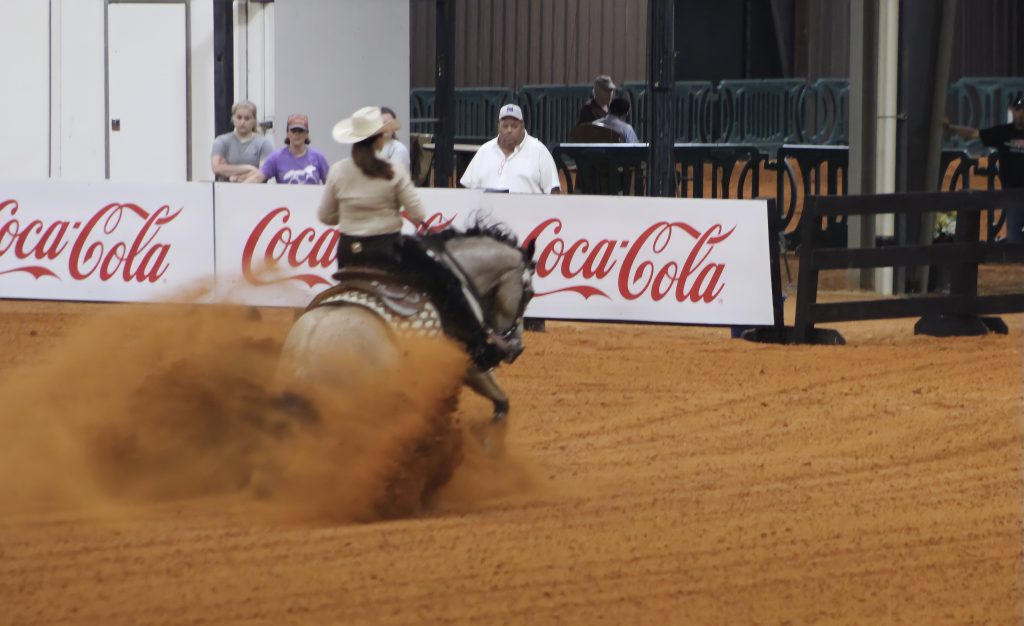
Shannon (Raymond) Rafacz won seven world championships with Charlie Smith and Dutch Chapman. She remembered, “I started riding with them in 1987 when Dutch was still at Charlie’s place. They would have reinings with the open shows in Maryland and my dad asked if I would like to try that. He met Mike Jennings, who told him if we wanted to show in reining we needed to see Charlie Smith, who just happened to be very close to where we lived.”
The first day they went to Charlie’s place, he and Dutch put her on three horses. One was a pleasure horse, and one was a mare named Mary Magdalene, that ended up being PRCA Bucking Horse of the Year. Then she rode a reiner.
Shannon said, “After that day they asked my mom if they could have me and I rode with them until 1993 when they split. Then I rode with Dutch until 1997. In 2001 I got out of college and rode with Charlie again where – in South Carolina?? “
She recalled the route to success that led to her world championships. “We didn’t have a say in what horses we bought. They’d say to bring our checkbook and tell us, ‘If we say you can win on a horse, you can.’ And they were right most all the time,” she said.
The miles traveled added up quickly. “We would go to three horse shows in three different states in the same weekend. It was an amazing lifestyle,. You could go to the big open reinings and see the who’s who’s and young guns like Brian Bell and Jordan Larson, all while working toward your own title,” Shannon explained.
She shared a story. “When I won my first Lawson Bronze, Charlie had my mom sign me up but not tell me I was entered in the Non Pro. It was in 1991 in the rain at Willow Brook and I was riding One Great Dude. We went tearing through the deep water and scored a 148! Charlie was crying and Dutch was ecstatic.”
When Charlie said he was all-in, it wasn’t just the riding, and he expected it to be the same for everyone on his team. Shannon said, “I started when I was 12, and if I wasn’t riding, we’d be at his house judging videos. He had videos everywhere from horse shows with a snowy screen in between runs. We’d just watch and learn. You had to know the NRHA rulebook inside and out and know every pattern stone cold. Then you had to know every penalty so you could keep track of where you were. You would be asked, ‘You have a half-point underspin. How are you going to make that up?’”
It was a magical time. Shannon recalled, “There were so many great wins and championships but basically the largest portion of NRHA world titles won through the early ‘90s was pretty much with Dutch and Charlie; the pictures prove it. There are banquet pics of our whole barn together at the awards.”
It was victory based on working men’s mindsets. “There were times it probably went to excess, and they’d remind us, ‘You are here to do your job not to socialize!’ Focus was so important.”
She said, “Dutchie still hauls people and preaches the importance of weekend horse show and how to ride. Anyone who runs for a title will tell you they learned so much in their title run year. Another thing is that people who run for those titles tend to stick around and remain part of the industry. “
“Both Charlie and Dutch were gruff and tough, but no one wanted it more for you than they did. They studied their non pros. As our industry has grown so have the roles of the trainers and coaches. We have pros focused on the futurity and aged events and we have those focused on Non Pros coaching and instruction. There is a place for both.”
She’s applied everything she learned. “I know every word and every play in their play books, and I use that so much today in my own coaching.”
Shannon credits Dutch for his enduring contribution to the reining industry. “He’s always thinking of this sport. He might call me at 10:30 at night to bounce an idea off me. If anyone deserves to be in the Hall of Fame, Dutch should be. He’s used reining to make an incredible impact on so many lives,” she said.
Trainers who care that much have a lasting impact on people’s lives as well as their success. Shannon recalled, “Years later, at the last show at Tryon I was showing in the Open and there was a picture of me running down and stopping and Dutch was right there watching from the ingate. I said to him later, ‘You are never not there. You’re always watching.’ And he said, ‘I always will be!’”
Karen Shedlauskus
Karen Shedlauskus, who serves on the NRHA Board of Directors, won two World Titles with Dutch Chapman. She recalled, “Dutch always said he was a horse trainer, a coach, a financial planner and psychologist. He’d work on the horses, provide instruction for his riders, help them figure out how they could afford it. And he’d council them on controlling their nerves and acquiring a competitive strategy. Plus, he’d often mediate with couples when someone felt his or her spouse was spending too much money on horses.”
According to Karen, the beauty of his program was that it made it possible for the average person to be a reiner. The concept was the more that went, the easier it was for everyone to go. She reflects, “I’d probably not be active in NRHA today if I didn’t get involved with them. That approach let someone of average means have a chance to be involved in the industry. I was 20-something and didn’t have a trust fund or dad writing the checks. The program said, ‘You can do this too. We do not have the most expensive horses and big fancy rigs, but we can make it happen.’ If you worked hard, he’d help to you to get there.”
Putting the work in was key, Dutch would say, ‘OK, you have to do everything I tell you to do. We’ve got the program figured out – you have to put in the time and follow the plan.”
Karen said, “It was extremely organized. You showed up at a certain time, did this and that. There was a sign-up sheet by the barn office that you put your name on if you wanted to go to a horse show. “
She explained, “When you rode with Dutch, you had one equipment bag. Everything you wanted them to haul had to fit in that bag, including your saddle, bridle, hat can, blanket and anything else you might need. Cheree Kirkbride became my hauling partner. On our very first trip together, I had just won my first pewter (trophy) at the Virginia State Fair in Richmond, that day. It was 1 a.m. and we were going to Sommerset, Penn. which was an 8-hour trip. They pulled in to meet me and Dutch told Cheree to show me the ropes. He put me in the driver’s seat and told her to get some sleep and let me drive. He said, ‘Put the Pewter on the dash and she’ll stare at all the way to Somerset.’ I did.”
Riding time was structured as well. Karen laughed, “When I hear people talking about feeling pressure having to ride in front of someone, I think of the days at Summer Wind. The indoor was small and on Saturdays there’d be 15 people in the arena. Dutch would have one or two of us work at a time with everyone else lined up on the wall. So, there were always 15 or 20 people watching you every time you rode. He wanted you to watch everyone work, too. He knew you could pick up things by just watching and listening. After a while, you got used to riding in front of people.”
She remembered, “It was quite a group there. Originally it was people from Maryland and nearby but then people came from all over. Tony and Susan Lomangino, Lee Schields, Charlie Vaughn – they’d all be at the shows. They’d spend the evening before riding with Dutch then go show.”
It was all for one – and one for all. “When you came aboard you put on the team jersey,” she said. “At the shows it was the same thing – Dutch wanted you to pay attention to everyone else’s coaching so you could learn. You played by the rules of the team.”
He would also have them study other successful riders, “One day he had me sit and watch Bonnie Hippensteel ride. Dutch said she was magic – a technician. He never stopped learning himself and he expected you to be a student of the game.”
If for some reason Dutch could not be at a show, he’d still be coaching. Karen noted, “We’d have to call and check in and get our instructions passing pay phone around and we’d all stand in line for our turn to talk to Dutch and tell him what we did.”
The system bred success for assistant horse trainers just as it did for youth and non pros and the mentorship provided them with the tools to run a business.
According to Karen, Dutch’s greatest contribution was bringing people into the industry. She said,” Those guys who worked for him are still in the business, making a living on whatever level. There was an international element to it as well.”
Brian Bell
NRHA $2 Million rider Brian Bell said, “Dutch is an incredible guy who loves the sport more than just about anyone. He has had a huge impact on people who are into reining because of him.”
He was great at helping us all figure out how to show our own horses and how to outthink them to prevent anticipation. He was great at thinking outside the box. Dutch would be the first to tell you ‘This is the horse you have to show today. Let’s get him ready.’ He might tell me to ride more or less, but differently than I had.
Brian remembered one horse he was riding during his tenure with Dutch that was extremely hard to show. One day Dutch told him, “I want you to do something brand new. Sit in front of his stall with your hat and chaps on and with him saddled with the bridle on. When you hear them call you, get on and walk as casually as you can to back gate and walk right in and show.’“
“It worked because the horse didn’t know she was about to show,” Brian said. “He had a lot of tricks to get us or the horse ready to show.”
“If for some reason, Dutch couldn’t be at a show, there would be a line at the pay phone. We would call Dutch and each one us would line up and talk to him on the phone. That went for trainers and clients alike. He’d tell us what we needed to do.”
“One day we went to the pay phone and we all said, ‘Our horses are doing great, stopping good, working – every one of us.’ Dutch said, “I don’t believe one word – be serious get out there and get your horses ready!”
As the story goes, one day some riders were looking at some less than steller arena ground at a show. “How are we going to show on that?” one asked.
The other replied, “When a big guy pulling an 8-horse steel stock trailer with ten horses in it gets here, he’ll show you!”
